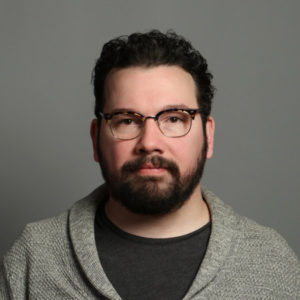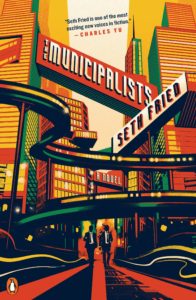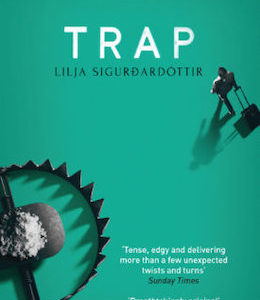Seth Fried’s The Municipalists is a wondrous chimera of a book. It’s a hybrid of noir mysteries and crime novels; it’s science fiction crossbred with a buddy-cop comedy. It’s as difficult to pin down as it is to put down.
When a cyberattack hits the United States Municipal Survey, smartphones burst into flames and agency drones crash from the sky. Leading the subsequent investigation is USMS agent Henry Thompson, a pencil pushing city planner whose closest relationship is with a model train. Even by his own admission, Henry is not the man for the job. But he won’t be sent into the field alone. Accompanying him is OWEN, an experimental, artificially intelligent hologram of a USMS agent who’s written his own protocol for day drinking.
They’re an improbable pair, a fact not lost on OWEN—after all, he has the “equivalent of 4,239.23 human brains” while Henry is equipped with “a brain that’s only impressive if you take into account the fact you grew it yourself.” But they’ll need every ounce (or gigahertz) of intelligence between them as they contend with anarchic government turncoats and their villainous plot to destroy the greatest city the world has ever built.
A hilarious thriller, The Municipalists challenges our reliance on new technology and the utopian ideals we hope it enables. And with it, Fried, who is acclaimed for his wildly imaginative short stories, displays his genre-bending talent and creativity in full force. I spoke with him about writing his debut novel and the world he and his mesmerizing characters investigate.
Benjamin Samuel: Your fiction is often speculative, and The Municipalists is no exception. Part of what makes it so engaging is that it doesn’t fit safely into any one genre: it’s a crime novel, it’s sci-fi, it’s noir, it’s a buddy-cop thriller comedy. How would you classify this novel? And what was the benefit of working with all these genres?
Seth Fried: I think all the classifications you mentioned are perfect. Rather than choosing between them, my first impulse is just to say, “Yes.” My tendency to write between genres has grown out of my own desire as a reader. My favorite experiences as a consumer of culture in general are those moments as a kid when I picked up a book, flipped to a channel, or turned on the radio only to have this intense moment of befuddlement. You’re thirteen years old and you’re looking down at an old paperback with a cover that features two mechanical dragons fighting to the death while simultaneously both playing chords on the same giant mandolin and you’re thinking to yourself, “What the hell is this?”

It’s one of those moments when a marketing campaign hasn’t already gotten to you, when a section of the bookstore hasn’t primed your formal expectations, when you are just confronted with a strange object and have to adjust your understanding of what’s out there. When I pick up a book, I want everything to be on the table in terms of what could happen between its covers. And I have the same impulses as a writer. I think the benefit of working like this is that I was able to incorporate everything I love about books into this one book without having to worry about any preconceived limitations.
As a devoted city planner with a morbid fascination with model trains [his parents were killed in a derailment], Henry is not the typical hero. He’s not, for instance, a grizzled detective or a veteran pulled out of retirement to save the world. When did you know that Henry was the right person for the job?
As a story writer, I think sometimes you’re trying to find the worst person for the job. If you’re writing a story with a giant bull in it, you immediately start thinking about a china shop. I was imagining a story in which the greatest city in the world was threatened, and so I started thinking of a person who cared about cities more than was probably healthy and who would have to step way out of his comfort zone in order to stop that kind of threat. As I wrote him, I realized that Henry was antisocial in a way that a lot of us are without realizing it. He has withdrawn into his own preferences and ways of thinking. He has carved out a niche for himself where even the negative feedback he gets from those around him can’t really help him out of his stagnation but only reinforces the walls he’s put up around himself. So Henry is as much there to confront the obstacles of the novel as they are to confront him. And obstacles in a story aren’t always bad. One of the biggest obstacles he faces is the fact that a charming AI wants to day drink and be best friends. I’m simplifying my description of character and plot calibration just so it’s easier to express here. In reality all these considerations are informing each other at once. But this is the gist of how Henry came to be at the center of all this.
Despite being a holographic projection of a supercomputer, OWEN can sometimes feel more human than Henry—or at least OWEN seems to enjoy life a little more. But ultimately, there are limitations to what he can do. What were some of challenges of having an AI character?
OWEN was a lot of fun to write. Since he’s a shape-shifting light projection, he’s essentially a superhero who can’t physically interact with anyone. So anything he wants to accomplish has to come through trickery or convincing Henry to give some life-threatening strategem the old college try. Exploring that space with him was a blast. But even with the disadvantage of being non-corporeal, OWEN’s powers were a lot to balance out in order to keep things sporting. That’s where his more human qualities came into play. Though powerful, OWEN is erratic, easily offended, manipulative, and vain. So it helps keep things interesting that (as is the case for many of us) OWEN’s personality quirks end up being his own brand of kryptonite.
As part of the initial attack, a virus shuts down the US Municipal Survey headquarters, trapping people in conference rooms and causing their smartphones to explode. Is there a lesson here about the growing presence of technology in our lives?
“[E]very time I put my phone in my pocket there are about three seconds where I think about it exploding and me bleeding out on the F train. As a writer, I think you need to trust that the things scaring you are significant on some level.”I think I do have some anxiety about that. For instance, I’m terrified that my phone will explode. Not so terrified that I’ll change my behavior, but every time I put my phone in my pocket there are about three seconds where I think about it exploding and me bleeding out on the F train. As a writer, I think you need to trust that the things scaring you are significant on some level. So in that first attack I was just trying to make the event seem intimidating, pervasive, and unpleasantly intimate. I did that by focusing on an object that we have with us at all times and that we’re dependent on without having any real understanding of how it works. The image of an explosion is just shorthand for our implicit vulnerability to this object. Also, according to the articles I read on my phone, phones sometimes do explode. So watch out everybody!
What are your hopes and concerns for artificial intelligence?
If the human race succeeds in creating an entity as intelligent and complex and with as much free will as we have ourselves, then I think that entity would be equal to human beings not just in its abilities but in its rights as an individual. This idea makes me hopeful in the sense that this would be a pure and awesome act of creation. After all, life is at its best when it’s making more of itself. My concern is that human beings have a pretty hideous track record when it comes to embracing the equality of individuals who are even slightly different than the empowered majority. So I worry that what should just be the natural upshot of the strange gift of sentience we’ve received (humbly passing it on) will actually result in the human race creating a new genre of atrocity. I think the idea that the development of artificial intelligence would automatically be a Skynet situation comes out of the colonial tradition that always tries to paint the other as a danger that needs to have its back broken before it can be trusted.
Metropolis, where much of the novel takes place, is a marvel of efficiency and infrastructure. How much research did you do?
I got to read and re-read a lot of amazing books. The Death and Life of Great American Cities by Jane Jacobs was one that I’d read before I even had the idea for this novel. It was one I revisited and thought about a lot as I developed the idea. Jacobs’s point of view is essential and lays bare a central problem that persists in urban planning to this day. The best solutions for cities are frequently counter-intuitive and the worst solutions tend to make a lot of sense at first glance. Apartment buildings with internal courtyards seems like a nice idea, but safety in a city relies on public visibility. When you narrow a sidewalk to ease traffic congestion, you’re actually scaling back a vital public space in order to worsen congestion by giving more people the idea that driving in a big city is a tenable idea. Another great book is The Triumph of the City by Edward Glaeser. His book offers a modern update to Jacobs as well as a compelling counterargument to her position on height restrictions and NIMBYism in general.
What makes for a convincing villain? How do you create a compelling but diabolical plan?
“[T]he best way to access your inner villain is to take a deeply held belief of yours and assume that you’re objectively right.”Good villains can’t just be evil. They have to have plausible ideals and rationales to lead them to their acts of villainy. I think the best way to access your inner villain is to take a deeply held belief of yours and assume that you’re objectively right. Rigidly follow that line of thinking to its furthest point. More often than not, that will lead you to some scary places. I agree with the villains in my book and if I shared their unwavering certainty in their own point of view I would probably be as dangerous as them.
Sarah Laury, a media sweetheart who went missing during the attack, is also an orphan, but her upbringing has been more of a fairy tale compared to Henry’s more Dickensian childhood. Without spoiling too much, can you talk about her role in the novel and how her privileged upbringing shaped her view on the world?
I think Henry and Sarah are very similar people who were just dropped into radically different circumstances. Sarah sees her trajectory from orphan to elite as a mantle of responsibility to be wielded for a greater good. Henry sees his own youth as a cautionary tale driving him to devote his life to the established order. They’re both passionate, civically minded, and uncompromising people who only have different points of view because of where they stand in the world.
This is your debut novel, but you previously published a brilliant collection of short stories, The Great Frustration. What was the experience of writing a longer narrative like for you?
For me it was pretty intense. When I’m writing a first draft of anything, there’s always a voice in my head asking, “Is this anything? Are you sure about this?” With a short story, that voice is easier to manage. You ask it to be patient and give you some space for a few weeks. Before you know it you’re revising and the piece has started to come into focus. The voice is forced to apologize and you both agree that you’ve earned a beer. But with a novel, the period of uncertainty in which that voice thrives is much longer. So that was a challenge. For months and even years, you’re sitting down to write everyday and just throwing the kitchen sink at the page, forcing yourself to work hard even though you know you’re basically just generating raw material for you to shape later.
Though in the end I think that ended up being the saving grace of the process. Writing a novel is too long and demanding of a process for anyone to do it both well and for the wrong reasons. When that voice asks “Is this anything?” I think what it’s really asking me is something along the lines of “Is this publishable?” or “Will the people I admire look down on me for thinking this is interesting or funny or important?” That voice comes from the part of my brain that wants me to mitigate risk and please others. For years I wrote short stories by just doing my best to suppress and ignore those questions. But with a novel I finally had to come up with an answer, which was that I didn’t know if this project was anything and that was okay. I had to accept that the kind of stories I wanted to write couldn’t come out of the sense of certainty these questions were insisting on.
The Municipalists seems primed for a sequel. Can we expect to see Henry and OWEN return?
I would do it in a heartbeat. I love these knuckleheads. I’ll just will that into being now. Working title, The Municipalists II: Plan Harder.


















